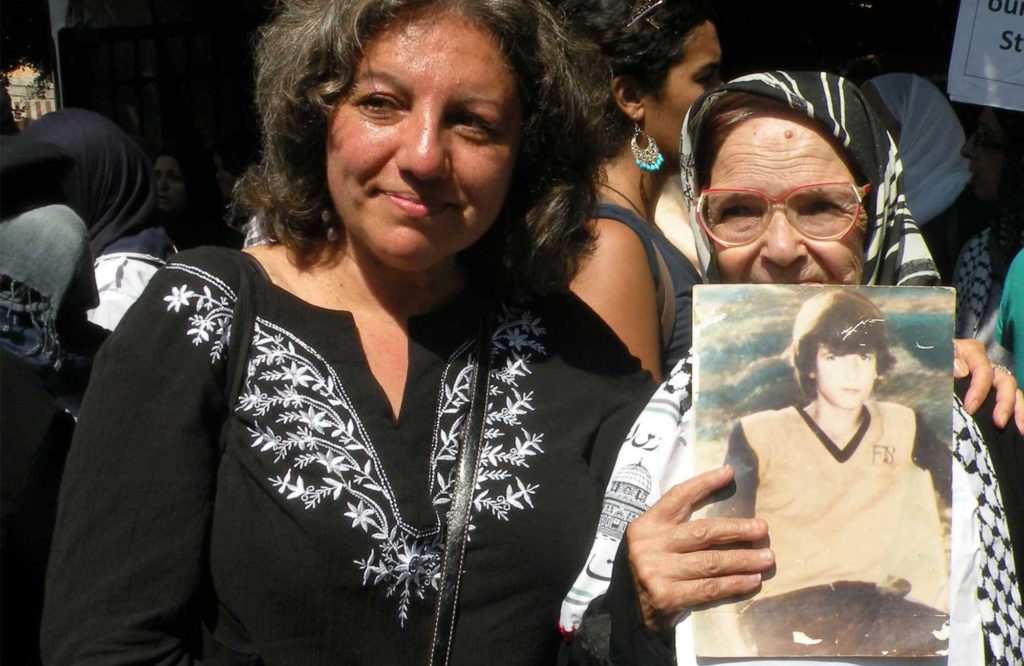Palestine is always close to my heart even if I’m far away
Posted in: peopleofanera
When I was a teenager, my father planted a fig tree in our backyard. Each morning he would go out to his garden, his small bustan, to check on his shajarat teen. This was in New York. As you might expect, the poor tree struggled to survive through cold winters and short summers. Yet my father insisted on nurturing his fig tree, because for him it was like keeping a little taste of Palestine.
Who could blame him for trying, and for his nostalgia? It had been a long time since any of us had been home. My parents were forced to flee Haifa in 1948 and then, like so many other Palestinian refugees, they were transplanted from place to place: Syria (where I was born), Lebanon (where I had my childhood), and then upstate New York (where we moved when I was 11 years old). Each new place redefined the concept of home, and somehow took us farther from it.
It wasn’t until I was 24 that I first visited Palestine, and it was then that I realized that it was home. I visited my great grandfather’s house in Nazareth and met relatives I had heard about all my life, like Aunt Salwa in Jerusalem and cousin Emil in Ramallah, and got to know my father’s cousins, who had stayed in Jaffa after the war of 1948. Everyone I met spoke Arabic with a Palestinian dialect, like my family and me. And their families, like mine, all shared the same painful history. For once I felt like I belonged, even though I had never set foot in Palestine before that trip.
That was when I decided to devote my personal and professional life to the Palestinian cause. I felt a particular duty to do so because my family was relatively lucky. As transplants, just like our fig tree in New York, we lived a middle-class life, spared from the possible destitution of refugee camps. We were the diaspora. Although we felt like we lived in exile, al-manfa or al-ghurba, we had the chance to build a life elsewhere.
The experience that deepened my commitment to the cause even more was in 2012, when I visited the Sabra-Shatila Palestinian refugee camps — a place Anera knows too well — with my friend Ellen Siegel on the 30th anniversary of the tragic massacre there. I was struck by the raw pain that is still felt among residents, and also by the terrible conditions they still endure — poverty, unemployment, the lack of basic infrastructure, and no political solution in sight. It’s a combination of all these conditions that has created an untenable situation for Palestinian refugees.


Zeina with the mother of a young man who was killed in the Sabra-Shatila massacre of 1982.
Far away here in the US, I can’t just forget about all the suffering and injustices that I’ve seen. I think about it all the time — like when I run my water tap or throw away produce that’s just a few days old. I imagine what a poor family could do with these precious resources that we take for granted. And when I see children here who are able to have real childhoods, like my own children did, I think of the kids in Gaza who have lived through three wars in the past decade and are under constant threat of the next one.
Palestinian poet Khaled Juma penned a moving poem that captures this injustice, titled “Oh Rascal Children of Gaza.” At first, the poem complains of mischievous neighborhood kids who caused a ruckus in the streets before the war. After the war, they were gone. Wistfully, Juma spends the last lines of his poem addressing these children, who are now gone, and lamenting with these words:
Come back
and scream as you want
and break all the vases.
Steal all the flowers.
Come back.
Just come back…
It’s no wonder that a sense of hopelessness can take over. But there are also some shreds of hope that promise the possibility of a better future. In the face of unbelievable, yet very real, difficulties Palestinians, Syrians and Lebanese are bringing about change in their own lives. They know what they need and work hard to improve their situation. They have dignity. I’ve seen it firsthand. It’s all about the people. That’s Anera’s focus and that’s why I support Anera’s work.
OUR BLOG
Related
Joint Statement 200+ NGOs call for immediate action to end the deadly Israeli distribution scheme (including the so-called Gaza Humanitarian Foundation) in Gaza, revert to the existing UN-led coordination mechanisms, and lift the Israeli government’s blockade on aid and commercial…
